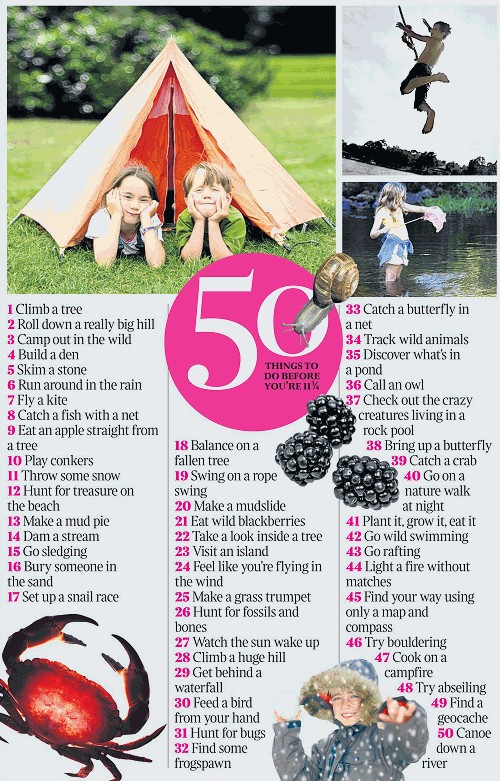
By Oliver Moody
Source: TimesOnline, Last updated at 12:01AM, April 13 2012

* to play conkers - Conkers is a traditional English children's game played using the seeds of horse-chestnut trees. The game is played by two players, each with a conker threaded onto a piece of string: they take turns striking each other's conker until one breaks.
* frogspawn - Froschlaich
* bouldering - Klettern an Felsen
Text:
Whether it’s stealing a policeman’s helmet or finally reading War and Peace, we all have things we want to do before we die.
The “bucket list” has become such a sign of our times that there is even a social network dedicated to sharing cherished ambitions — and a new campaign is challenging children to take on the same mentality. Launched by the National Trust, 50 Things To Do Before You’re 11¾ aims to encourage “sofa-bound” young people to start exploring the world around them.
The trust has appointed five “elite rangers” to help children to throw themselves into a daunting list of activities including damming a stream, going wild swimming and lighting a fire without matches. Tree Man, Captain Skim, Den Boy, the Bug Catcher and Midas the treasure hunter will join forces in the fight against what the National Trust calls “nature deficit disorder*”: a growing gulf between Britain’s children and the natural world.
Dame Fiona Reynolds, the trust’s director-general, told The Times that children needed to be set free from the strictures of obsessive parenting and health and safety rules.
“Children are missing out on the sheer joy and physical and mental wellbeing of being able to play outside and experience nature in all its messiness,” she said. “It’s partly technology and it’s partly a sort of nervousness. The freedom for children to roam unsupervised has shrunk by 90 per cent since the Seventies. The world is a different place and people have become very anxious about the risks, real or perceived.”
A report published by the trust found that children’s emotional and physical health was suffering as a consequence of their separation from nature.
The study linked problems such as asthma, rickets* and depression to a failure to let children out into the natural world. Stephen Moss, the author, concluded: “Children who learn outdoors know more, understand more, feel better, behave better, work more co-operatively and are physically healthier. Importantly, this is not just for able and motivated pupils. Under-achievers also do better in a natural environment, especially when exposed to high quality, stimulating activities.”
The “11¾” bit comes from a finding in the report that if children do not form a connection with nature before they are 12, they are far less likely to do it later on. Snail races, mud pies and bug hunts may not be the complete solution, but the trust hopes that they will be a start. Children will even be offered classes in stone skipping*.
Mark Astley will become Captain Skim when he dons* his elite ranger costume. He will be teaching children how to find the perfect stone and skim it across the surface of a pond or lake, getting it to bounce as many times as possible.
Other rangers’ special powers include scaling tall trees and being able to name more than 300 species of moth. Helen Meech, the trust’s assistant director of external affairs, said that the idea had been to put together a range of things that children of all ages could try. The list of 50 was whittled down* from more than 400 suggestions from trust members.
“One of the things I loved doing when I was a kid was wild swimming, so I would recommend that,” she said. “I used to swim in the local river. I think I’ve done most of the activities. I’m very bad at skimming stones*, but I still have competitions with my family.”
587 words
Annotations:
* nature deficit disorder - Natur-Defizit-Syndrom
* rickets - Rachitis
* stone skipping - Steinehüpfen
* to don - sich anziehen
* to whittle down - nach und nach reduzieren
* to skim stones - Steine übers Wasser hüpfen lassen
Assignments:
1. What is the National Trust's idea concerning their new campaign?
2. What reasons are mentioned in the text why most children suffer from a nature deficit disorder?
3. Think of your own childhood and say which of above activities you pursued and enjoyed and which ones you have never tried.
4. Do you think that committing more time for nature activities can mould one's character?
|

